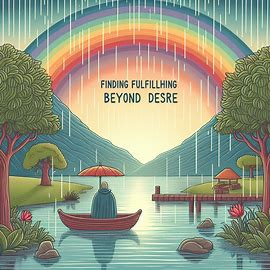The True Essence of Peace
Once, a king sought to find the most evocative representation of peace and offered a prize to the artist who could paint the best picture encapsulating this concept. Many artists eagerly participated, submitting their finest works. After careful consideration, the king narrowed his choices down to two pictures that stood out among the rest.
The first picture
depicted a serene lake, its surface so calm and clear that it mirrored the
majestic mountains surrounding it. Above the lake, the sky was a flawless blue
adorned with fluffy white clouds, creating an atmosphere of tranquility.
Observers who gazed upon this picture unanimously agreed that it epitomized
peace.
In contrast, the
second picture also featured mountains, but they were rugged and imposing. The
sky above was tumultuous, filled with dark, angry clouds and flashes of
lightning, with rain pouring down. A roaring waterfall cascaded down the
mountainside, contributing to a scene of apparent chaos. However, the king
noticed a small yet significant detail that others might have overlooked:
behind the waterfall, in a crevice of the rocky cliff, a tiny bush grew. In
this bush, a mother bird had built her nest. Despite the tumultuous
environment, the mother bird sat calmly on her nest, undisturbed by the
surrounding chaos. This image conveyed a profound sense of peace.
When it came time to announce the winner, the king chose the second picture. This decision surprised many, as the first picture seemed to be the quintessential depiction of peace.
The king explained his
choice, saying, "Peace does not mean being in a place where there is no
noise, trouble, or hard work. Peace means being in the midst of all those
things and still being calm in your heart. That is the real meaning of peace."
The king's selection underscored a vital lesson: true peace is not about the absence of challenges or disturbances but about maintaining inner tranquility amidst them. The mother bird, nestled serenely in her nest despite the raging waterfall and storm, symbolized this profound inner calm. The second picture, with its vivid contrast between external chaos and internal serenity, beautifully captured the essence of peace in a way that the first picture, though visually tranquil, could not.
This story reminds us
that real peace comes from within. It is about finding calmness in our hearts
regardless of the external circumstances. True peace is an inner state that
allows us to remain composed and steady even when the world around us is turbulent
and unpredictable.
The Unclaimed
Authorship and Eternal Nature of the Vedas
The Vedas, ancient scriptures revered across various traditions, stand as a testament to the profound spiritual and philosophical wisdom of humanity. What makes the Vedas particularly intriguing is the fact that no one has ever claimed their authorship. In a world where people seek recognition and patents for their creations, the absence of a claimed author for the Vedas is indeed remarkable. If there had been an author, some mention would likely exist. This suggests a unique origin beyond ordinary human creation.
Another extraordinary
aspect of the Vedas is their unchanging nature. Every letter, syllable, and the
rhythm for chanting have remained fixed through millennia. Despite the human
tendency to alter tunes, words, and patterns over time, the Vedas have been
preserved in their original form. If ancient Rishis were to visit us today,
they would find the Vedas exactly as they were thousands of years ago. This
permanence hints at their eternal quality, suggesting they are not merely human
creations but something more timeless.
The sheer size of the Vedas is another factor that sets them apart. They are vast, extending beyond imagination, and were traditionally transmitted orally, hence the term "Shruti," meaning "that which is heard." Even though many parts of the Vedas are lost, the remaining texts still require 245 hours to chant from beginning to end. The enormity of the Vedas and the meticulous oral tradition that preserved them argue against the possibility of a single human author or even a group of authors. Human consistency over such a long period is implausible, yet the Vedas have maintained coherence and unity without contradictions.
Contrary to what might be expected, the Vedas exhibit no internal contradictions despite their vastness. Superficial readings or translations without proper understanding might suggest discrepancies, but deeper study reveals a harmonious and consistent body of knowledge. This internal consistency further supports the idea of their divine origin.
The Vedas also reveal
knowledge that was unknown to the world until recently. For instance, the
Atharva Veda mentions seven continents, including Antarctica, which was only
discovered in 1911. Such revelations point to a source of knowledge beyond the
contemporary understanding of the time.
For sincere seekers of
truth and knowledge, the Vedas offer a profound insight into the nature of
existence and consciousness. They assert that consciousness alone is eternal
and forms the essence of all being. As educators, parents, and leaders in society,
it is our duty to delve into the wisdom of the Vedas, reflect upon it, and
impart this knowledge to others.
The journey into Vedic wisdom begins with the realization that "Pragyanam Brahman" – consciousness is God. This infinite truth signifies that the divine consciousness, or Brahman, is omniscient, omnipotent, and omnipresent. As mentors, we must understand and convey that God is not confined to finite matter; instead, life and consciousness represent the divine essence within us.
The Vedas guide us to
reflect on where this consciousness resides. Through introspection, we realize
that all perceived objects are transient, and the true essence of consciousness
is within our innermost self. This realization is encapsulated in the statement
"Tat Tvam Asi" – "That Thou Art," highlighting the unity of
individual consciousness with the universal.
Teachings from various
religious texts echo this sentiment. For instance, the Bible's injunction to
"Love thy neighbor as thyself" underscores the shared divine
consciousness within all beings. Similarly, Islamic teachings proclaim
"Ana-al-Haq" – "I am the Truth," emphasizing the divine
presence within each individual.
The Vedas explain that
by separating oneself from material attachments, one can experience "Ayam
Atma Brahman" – "This Atman (soul) in me is Brahman." Our body
and mind are mere matter, animated by the divine consciousness, or Brahman.
This leads to the profound realization "Aham Brahmasmi" – "I am
Consciousness."
Ultimately, this
journey of self-realization reveals that all existence is interconnected,
encapsulated in the phrase "Sarvam Khalvidam Brahman" – "All
this is Brahman." Consciousness, being infinite, is beyond definition but
can be expressed as "Sat-Chit-Ananda" – "Unchanging
Truth-Consciousness-Bliss." Through righteous conduct and selfless work,
we can purify and expand our minds, reconnect with this eternal truth, and
harmonize with the whole of creation.
IF HE EXIST
I drive joy there was a doctor in Benaras who
spent 7 minutes in the morning and evening for mediation on God. Knowing this,
his colleagues and friends laughed at him. One day they argued that he was
wasting 7 precious minutes on something, which he had been misled into
believing. The doctor replied, “Well, if God does not exist, I agree that I am
wasting 7 minutes a day. But, if He exists? I am afraid you are wasting your
entire lifetime. I prefer to waste 7 minutes rather than a lifetime. Why should
you grudge me the 7minutes joy that I derive 4m.-
ILLUSTRATED REVIEW
:7thheaven moment of the week in nba
dallas maverick 77 scored most in the third game, in ipl s.narani no 74 got mvp,































